-
New Thinking Blog: Contracts for Difference – Devilishly Detailed

Contracts for Difference – Devilishly Detailed Tom Steward, IGov Team, 30th May, 2013 About Tom: http://projects.exeter.ac.uk/igov/people/igov-team/tom-steward/ Twitter: https://twitter.com/Steward_T It seems the Government and EDF may be moving towards shaking hands on a deal to financially support to a new nuclear plant in Somerset, Hinkley C. Unsurprisingly, this has led to enormous speculation over how much consumers will have to shell out over the coming decades – such as here, here and here. These figures are little short of terrifying, and although I think they should be taken with a healthy pinch of salt[1], I want to explain why
Read More » -
New Thinking Blog: Climate, People and Scale – Why we are missing opportunities for real change

Climate, People and Scale – why we are missing opportunities for real change Richard Hoggett, IGov Team, 22nd April 2013 About Richard: http://projects.exeter.ac.uk/igov/people/igov-team/richard-hoggett/ Twitter: https://twitter.com/HoggettRD The gap between the rhetoric and reality in climate and energy policy has never been wider. We recently passed the symbolically important 400 parts per million level of carbon dioxide in our atmosphere, a level not seen for millions of years; and WWF asked how long will it be before we hit 450ppm, the level at which there is a 50:50 chance of keeping global warming to less than two
Read More » -
Presentation: Being Specific about the Politics of Low Carbon Transitions
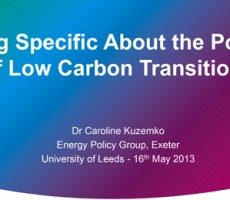
Presentation: Being Specific about the Politics of Low Carbon Transitions From: Caroline Kuzemko To: Research Meeting with Earth and Environment Group at Leeds University Download Presenation: CK-Leeds-16-05-13 Summary: Socio-technical transitions literatures can tell us a great deal about how complex, dynamic systems transition – partly through the analysis of previous large-scale, industrial transitions. One key insight from STT literatures is that governance, and specifically policies that can help to incubate and support technological innovations, is important to low carbon transition. The politics of energy system change, towards a lower carbon future, is however not at all straight forward
Read More » -
New Thinking Blog: Will the negawatt solution work in the domestic sector?

Will the negawatt solution work in the domestic sector? Matthew Lockwood, IGov Team, 14th May 2013 About Matthew: http://geography.exeter.ac.uk/staff/index.php?web_id=Matthew_Lockwood Twitter: https://twitter.com/climatepolitics The idea that the best way to provide energy is simply to avoid unnecessary use in the first place has been around for some time. Back in 1989, Amory Lovins coined the term “negawatts” (energy saved by cutting out waste) to emphasise the contrast with megawatts of power or heat that needs to be generated if that waste is not eradicated. With the current Energy Bill potentially providing the biggest chance in a decade for rethinking
Read More » -
Presentation: Introduction to Day

Final Agenda 9.40 Introduction to day • Richard Hoggett – DOWNLOAD presentation: Hoggett_R – welcome 9.45 – 11.00 Panel 1: Chair Richard Hoggett • Caroline Kuzemko and Matthew Lockwood – The Importance of Governance for Innovation: a Theory of Managed Energy Transition • Ronan Bolton and Tim Foxon – Negotiating the energy policy ‘trilemma’ – an analysis of UK energy governance from a socio-technical systems perspective • Audley Genus – The Governance of Sustainability Transitions: a discourse-institutional approach 11.15 – 12.30 Panel 2: Chair Caroline Kuzemko • Frank Geels – Politics and power
Read More » -
Panel 1: The importance of governance for innovation: a theory of practice transition
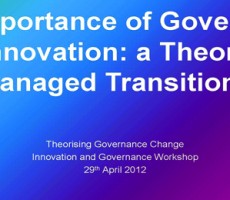
The importance of governance for innovation: a theory of practice transition Matthew Lockwood, Caroline Kuzemko, Catherine Mitchell, Richard Hoggett – University of Exeter Abstract Understanding why and how it is that some countries are able to implement policies which lead to deeper and faster change in sustainable practices and outcomes is an important step in enabling an acceleration in the transition to a sustainable energy future. This paper presents a tentative, provisional framework for analysing energy system transition, differential outcomes and the reasons for them. It suggests that energy system rules (in enabling or blocking
Read More » -
Panel 1: Negotiating the energy policy ‘trilemma’ – an analysis of UK energy governance from a socio-technical systems perspective
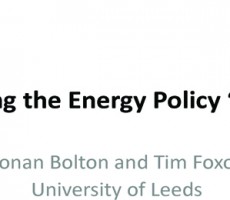
Negotiating the energy policy ‘trilemma’ – an analysis of UK energy governance from a socio-technical systems perspective Ronan Bolton and Tim Foxon – University of Leeds Abstract: This paper analyses contemporary energy governance dynamics in the UK, focusing on recent policy changes designed to promote electricity sector investment and enable the transition towards a low carbon energy system. The purpose of the paper is to analyse how UK energy governance is evolving to address the energy policy ‘trilemma’ of affordability, decarbonisation and energy security, and to explore potential implications for long term transition pathways to
Read More » -
Panel 1: Sustainability transitions: a discourse-institutional approach
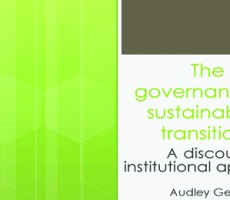
Sustainability transitions: a discourse-institutional approach Audley Genus – Kingston University Abstract: The paper considers problems and possibilities connected with governing and realising the ‘transition to sustainability’ – or at least a more deeply resilient energy system. Conceptually its focus is on institutional and discourse analysis and the development of a discourse-institutional perspective of the transition to sustainability. The first strand of the paper outlines the potential insights that may be derived from adopting an approach based on a more thoroughgoing appreciation and application of Scott’s (2008) work on neo-institutional theory and its relevance to the
Read More » -
Panel 2: Politics and power in low-carbon electricity transitions: A multi-level analysis of green niche-innovations and resilient regimes
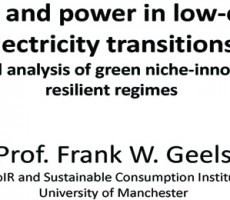
Politics and power in low-carbon electricity transitions: A multi-level analysis of green niche-innovations and resilient regimes Frank Geels – University of Manchester Abstract: This paper aims to draw the attention of social theorists to the topic of transitions in socio-technical systems. This topic has great promise for debates on climate change, peak oil and wider sustainability challenges, which require shifts to new energy systems, food systems and mobility systems. Socio-technical transitions are not just technological and economic processes, but also entail political power struggles and cultural discourses. The paper introduces the multi-level perspective on transitions
Read More » -
Panel 2: The rise of accelerated energy innovation and its implications for innovation theory
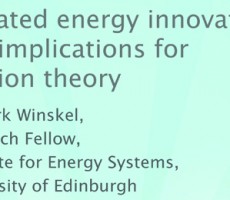
The rise of accelerated energy innovation and its implications for innovation theory Mark Winskel – University of Edinburgh Abstract: This paper considers the changing dynamics of energy innovation under accelerated change imperatives. It also reflects on the role of innovation theory in sociotechnical system change, in the context accelerated change imperatives. It will consider the possibility that prominent sustainable innovation theories, because they articulate an essentially niche-led account of sociotechnical system change, offer a partial view of innovation dynamics for highly coupled sociotechnical systems under accelerated innovation imperatives. This will be considered by reference to
Read More »






